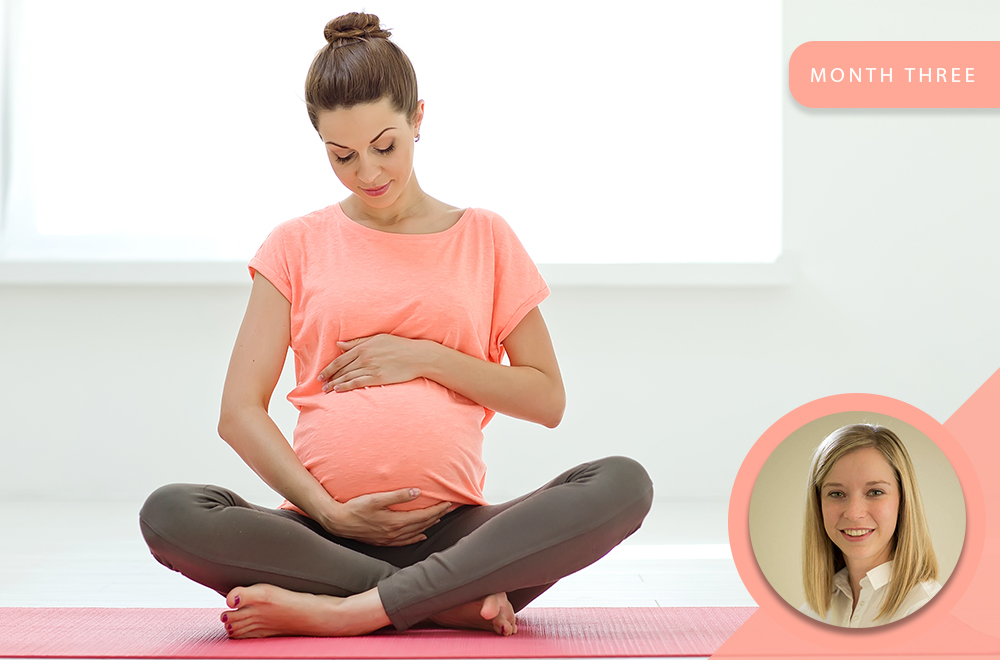
13 Jul Pregnancy: Month 3: A Physiotherapist’s Professional Opinion
Your body finally starts to settle and adjust to the influx of pregnancy hormones it has been dealing with. Nausea levels will start to decrease. However, moodiness and food aversions might continue. Your energy levels will start to return to normal. A glimmer of your old self is in sight!
If feeling unwell was a hurdle in the previous months of your pregnancy, this month is an excellent time to establish a good exercise routine you can continue with and maintain throughout your pregnancy. You should however have been doing your Kegel exercises from day one.
Exercise becomes very important from now on as this is when your middle will start to widen as it accommodates your growing uterus which is now the size of a grapefruit. You will start to pick up weight if you have not by now. The average weight gain is 1.5kg per month, gaining on average between 11.5kg and 16kg in total throughout your pregnancy.
As you start to gain more weight your normal body posture will start to change. To support your growing middle your lower back will start to arch slightly and in turn the bigger lower back arch changes the centre of gravity from being in line with your ankles to over the front of your feet. You may feel a bit more off balance than usual.
The relaxation and widening of your body’s blood vessels will lower your blood pressure between 12 weeks and 24 weeks. Your blood pressure will remain lower until 36 weeks. This could cause you to feel dizzy more easily than before. Following on the widening of your blood vessels, your circulating blood volume slowly increases by between 40% to 50% by the end of your third trimester. This means that your heart muscle may increase in size to push the larger volume of blood around your body as well as to the placenta. This combined with the ever-growing weight of the uterus pushing on the blood vessels surrounding it causes fluid retention around the rest of your body. Areas affected early on by fluid retention are your wrists and hands. The fluid retention could cause carpal tunnel syndrome which is a compression of a nerve in your wrist. It can cause pins and needles into your hands. This can be treated by elevating your arms and hands along with doing gentle hand exercises. A specific wrist splint provided by a physiotherapist or occupational therapist can also be worn during your pregnancy to ease the symptoms.
Fluid retention combined with the relaxation of your smooth muscles in your intestines leads to your body having an imbalance in the uptake of food during digestion. This does make you more prone to constipation which if not addressed by your doctor or dietitian may lead to hemorrhoids.
Your breasts now continue to grow outwards as milk ducts develop. Your breasts may increase between one and two cup sizes and in some cases more. Your torso might also increase in diameter which means that your bra band size will need to be extended by one or two sizes. This increase in your breast size may place more strain on your neck and middle back muscles. The weight of your breasts may also pull your shoulders forwards. This can cause neck pain and secondary headaches.
The increase in blood flow to your sweat glands causes you to perspire more easily. During exercise it is recommended to try and wear layers that you can remove if you feel like you are overheating and perspiring too much. Avoid exercising in very hot and humid conditions as you will sweat and overheat unnecessarily.
EXERCISE OF THE MONTH: NECK STRETCH
1. Stand or sit upright; lower tummy gently sucked in, chest lifted to straighten the spine, chin tucked in and place the arm of the side you wish to stretch behind your back.
2. Your other hand is over your head with the fingers reaching to your opposite ear and turn your head to look into the armpit of the arm resting on your head.
3. Gently pull your head sideways and slightly down away from the shoulder, whilst looking into the armpit and hold for 20-30 seconds.
4. Allow a few seconds rest between consecutive stretches. Repeat three times.



Pingback:Month 3: The First 12 Weeks (or so) are the Longest
Posted at 13:55h, 14 September[…] Pregnancy: Month 3: A Physiotherapist’s Professional Opinion […]